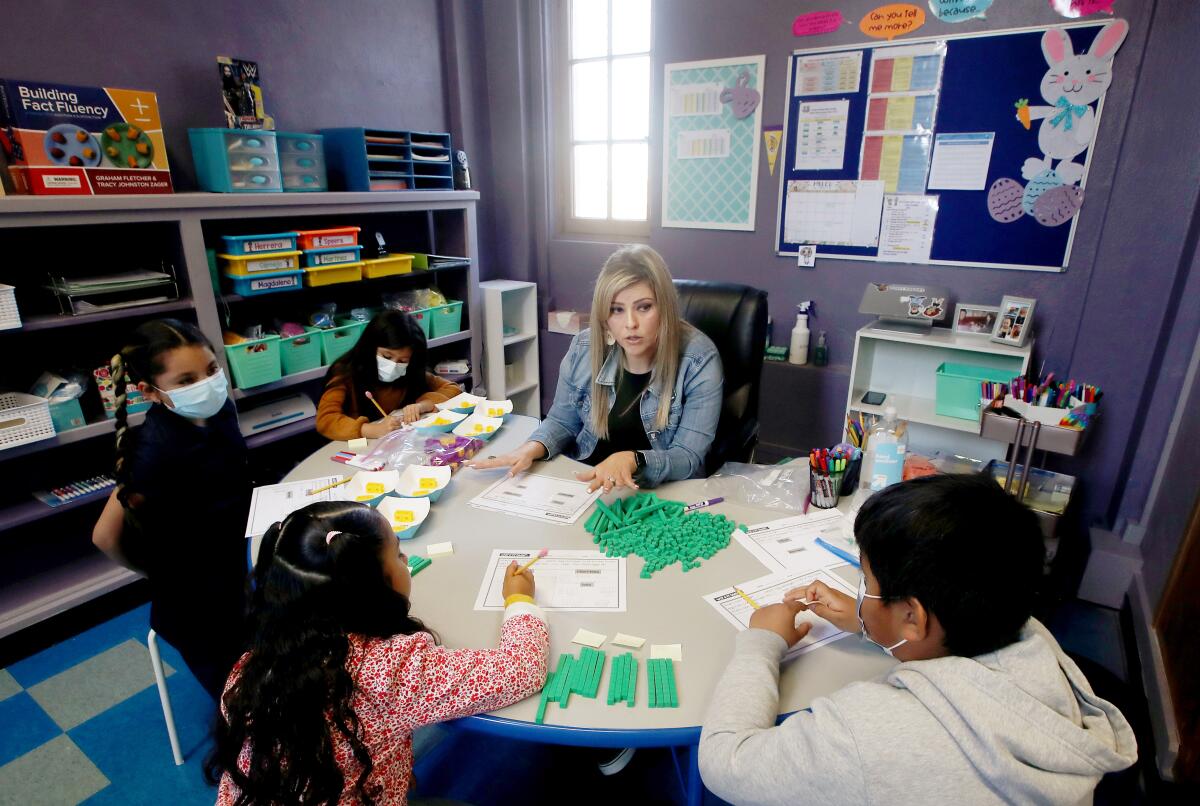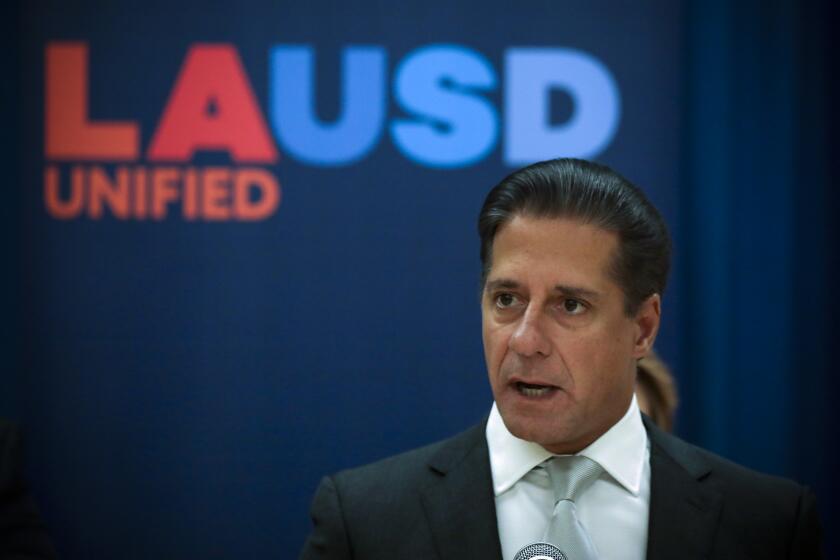Ending LAUSD’s Primary Promise reading and math program is a mistake

- Share via
We know the best insights about what works in a school classroom come from teachers. That’s why when many of them told us they are upset about the dismantling of the Los Angeles Unified School District’s successful Primary Promise reading and math program we became concerned. When we learned that the district had done little to share information about the issue with the more than 20,000 families whose children will be affected by cutting the program, we felt compelled to add our voices to those of teachers: Ending Primary Promise is the wrong move.
Primary Promise provides K-3 students with the individual attention they need to learn to read. And it takes the same approach to help students build a foundation in math.
One doesn’t need a jargon-filled, 40-page report to describe the program. Primary Promise funds the hiring and training of teachers and aides who provide direct help to students who need it the most. It’s simple, clear and something that teams at schools have proved they can implement at scale. It’s been put into action at more than 300 of the 450 or so elementary schools in L.A. Unified.
An L.A. schools program that officials portrayed as a success for helping struggling students improve academically is being substantially dismantled.
The awful truth in public schools across the country is that well more than half of elementary school children cannot read at grade level. This has big implications over a person’s lifetime. Learning is cumulative. When children learn to read by third grade they are then able to read to learn; if they miss this mark they are likely to falter in later grades. Research tells us that fourth-graders who can’t read at grade level are four times more likely to drop out of school. That in turn means they will go on to have much lower lifetime incomes. Surely, we can’t allow more than half of public-school kids to get left behind.
To see how Primary Promise works, let’s look inside a typical first-grade classroom with 24 students. One teacher tries to work with the students who are at grade level while also trying to provide help to some students in phonological awareness, others who struggle with the decoding of words and others working on letter sounds.
In other words, we’re asking a single teacher to teach four different groups of 6-year-olds at the same time. That’s really hard to do.
Primary Promise addresses the challenge by adding a second teacher or aide into the classroom so one teacher can work with the children who are at grade level while the other can provide help to small groups of students on their specific needs. Students selected to participate in the program are those who need help the most because they are well behind their peers.
L.A. Unified Supt. Alberto Carvalho said the program that will replace the lauded Primary Promise is more equitable and effective, while costing far less.
This approach takes center stage in the current national discussion about early literacy. Much has been reported on the wholesale shift in New York schools from “balanced literacy,” with a focus on discussing stories — theme, character and plot — to the “science of reading,” or phonics, which builds on the basics of sounding out and understanding individual words. Primary Promise is providing students in Los Angeles a big head start in the same direction with a curriculum rooted in best practices and teams of trained educators to do the job.
Primary Promise started in 2020. Since then, there have been three published evaluations of its results — October 2021, March 2022 and July 2022. All show that the program works extraordinarily well.
In one measure of the results, the district looked at samples of first-graders before and after the 2020 fall semester. At the beginning of the school year, only nine of 100 students in Primary Promise were reading at grade level, but by the end of the semester, that portion grew to 37 students. That compared to only two of 100 students not in Primary Promise who made similar improvement.
In addition to the data, teachers and families overwhelmingly tell us Primary Promise works. Parents Supporting Teachers, the largest parent-led support group in L.A. Unified, calls it “the most promising early literacy program in the nation.”
L.A. schools Supt. Carvalho had been looking for ways to lengthen the school year, and he finally achieved that. But he had to give up an attempt to shorten winter break from three weeks to two.
Supt. Alberto Carvalho has acknowledged that this approach works but defends his decision to cut the program on the basis of cost while also shifting funding to middle and high schools. The annual investment in Primary Promise is well less than 1% of L.A. Unified’s budget and help for secondary school students shouldn’t come at the expense of their siblings in elementary school.
L.A. Unified’s budget is a reflection of its values. As recently as March, the school district reported a record $5.8-billion surplus. Yes, some of that is from one-time pandemic relief funds, but unless the money has all disappeared, the superintendent and the school board could come up with the dollars to keep Primary Promise.
At the June 6 school board meeting, the superintendent spoke of evolving Primary Promise into something “more democratic and equitable.” We don’t know what he means by “democratic and equitable,” but we do know that English learners and Black students are making dramatic gains in Primary Promise. How about we call that righteous and way overdue?
Primary Promise has proved to be a remarkable success. It should be continued.
Austin Beutner and Ray Cortines both served as superintendents of L.A. Unified. Primary Promise was started when Beutner was superintendent.
More to Read
A cure for the common opinion
Get thought-provoking perspectives with our weekly newsletter.
You may occasionally receive promotional content from the Los Angeles Times.












